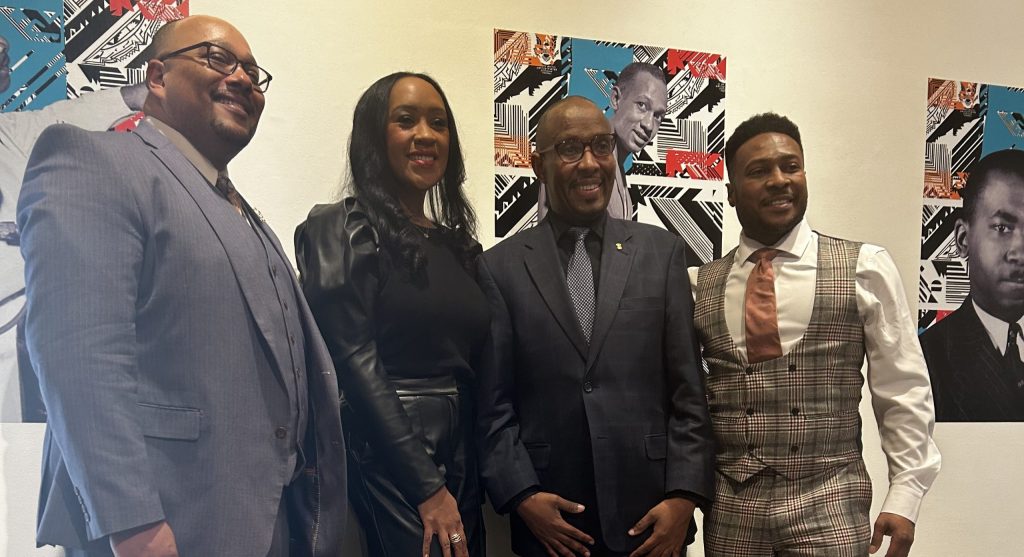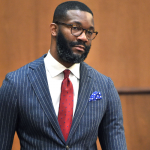By D. Kevin McNeir
Special to the AFRO
A trio of accomplished musicians, educators and vocalists kicked off Black History Month in Prince George’s County on Feb. 1 with a frank discussion about the unjust labor practices they have faced in their careers.
The panel discussion, “Music and Black Labor,” supported the Association for the Study of African American Life and History’s (ASALH) 2025 theme, “African Americans and Labor.”
The event, moderated by Patrick D. McCoy, organist and choirmaster at St. John’s Episcopal Church in Beltsville, featured Michele Cober, an attorney and former opera singer; Grayland Snead, a music educator and church choral director; and Keenan McCarter, a performing artist and member of the U.S. Army Chorus in Washington, D.C.

Cober explained the challenges she faced trying to financially support herself as a vocalist, which led her to leave the music industry and pursue a legal career.
“I was on the road on tour and was subjected to a variety of deplorable working conditions that threatened my physical health and were dangerous to my voice — all being in direct violation of my contract,” Cober said. “I guess you could say I had a revelation. I left the tour and realized that I could no longer go on. I had to change lanes and consider my options for a different career.”
Shortly after returning home, Cober learned she was being sued for not fulfilling her contract.
“I thought I understood the industry and believed I had been prepared for the challenges we often face, but I discovered that it takes a lot more than just having a good voice to succeed,” she said. “It’s a business, and while your voice may be your primary asset, if you don’t know how to manage your business, you’re not going to make it.”
Snead, who described himself as a lifelong advocate for the transformative power of music, said systemic challenges in education and related policies often prevent talented youth from advancing toward their dreams.
“America has changed the focus in public education from the whole child to a STEM society, but that leaves a lot of children on the outside looking in — kids who only come to school because they are passionate about the arts,” Snead said. “What tends to be ignored is the fact that music helps youth develop life skills that are transferable to almost any profession. And it’s wrong to view music as an afterthought. If America really cares about being a nation that’s rich in diversity and that welcomes all kinds of cultures, it’s imperative that music and musical training continue to be supported and available for youth.”
Cober agreed, adding that while STEM education programs are career-oriented, the options for musicians and vocalists are often vague and nonspecific.
“The things I learned at Duke Ellington High School and while pursuing two degrees in vocal music performance — rehearsals, working with coaches, auditions, cattle calls, attention to my health and even the disappointments that came from not being chosen — gave me a tough skin,” she said. “They helped me develop a level of precision and excellence that I have used throughout my life.”
The role of affirmative action and DEI
The conversation then moved to the impact of affirmative action and diversity, equity and inclusion (DEI) programs on African Americans. McCoy asked the panelists whether such policies had helped or hindered Black professionals.
Snead said DEI guarantees that there are advocates in the workplace for the voiceless and those from traditionally disadvantaged communities.
“The current trend to eliminate DEI in government and the workplace is detrimental to the kinds of opportunities available for Black people,” he said. “DEI, and before that affirmative action, allegedly leveled the playing field. But we are still working from the bottom.”
McCarter said he was surprised by the opportunities that came his way after joining the military.
“I’ve always wanted to pursue a career as a vocalist, but I also wanted to produce my own music — to write and record,” McCarter said. “Joining the military was a plus because it introduced me to musical theater and opened other doors. It provided me with additional income that I have used to promote myself, to fund other interests, all related to my career, and to help me take advantage of additional training opportunities that I needed to be a successful musical entrepreneur.”
Preserving musical traditions
As the panel ended, participants agreed that the legacy and significance of spirituals and hymns, which were prominent during the Civil Rights Movement, need to be passed on to the next generation.
“Students at performing arts high schools learned the spirituals and performed them,” Cober said. “We also learned the stories about those songs — what they meant to enslaved Africans and their children following the end of slavery. That’s not the case today.”
“Outside of the church, the tradition is no longer being emphasized, honored or passed on to our youth,” Snead said, “and that’s a real tragedy.”
The post Panelists explore intersection of ‘Music and Black Labor’ appeared first on AFRO American Newspapers.











